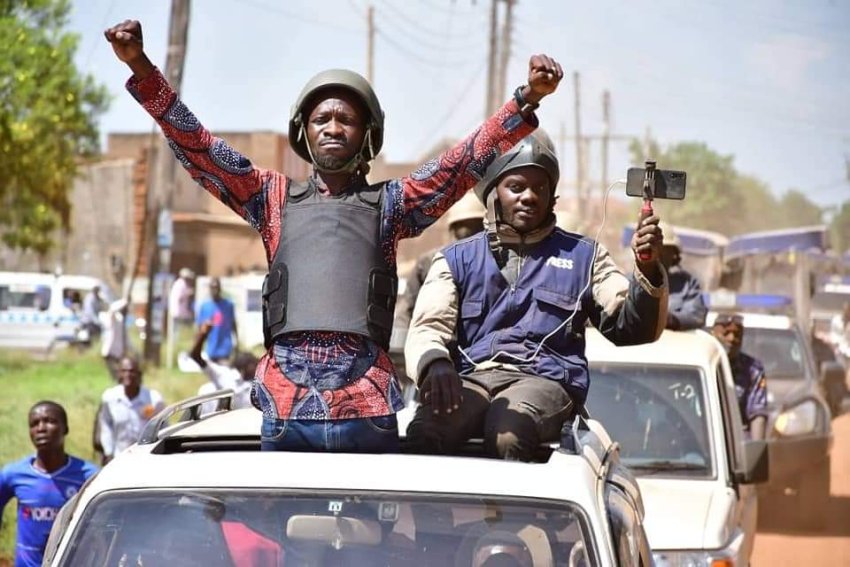
Yoweri Museveni, Uganda’s 76-year-old leader who has been in power since 1986, won another five-year term in the January 14 presidential election.
According to the Electoral Commission, he won nearly 59% of the vote, while his main rival, Robert Kyagulanyi, a reggae star-turned-legislator better known by his stage name Bobi Wine, secured 34%. Wine — who has alleged “widespread fraud” during the polls — was placed under arbitrary house arrest a day after the election.
Museveni’s sixth term in office follows the removal of presidential age limits in 2017 and term limits in 2005 that would have required him to step down. Polls showed that the majority of Ugandans were opposed to removing the age limit cap on the presidency and were in support of reinstating presidential term limits.
Violence, intimidation and irregularities
The opposition faced a highly skewed playing field. Elections were brought forward by three months to shorten the campaign period, hampering opposition parties in mobilising their supporters.
The Electoral Commission failed to implement significant reforms following the flawed 2016 elections, despite rulings from the Supreme Court that they do so. The 2016 election was accompanied by repression against sections of the opposition and critics of the government, as well as accusations of substantial and outright vote rigging.
The recent election was defined by the increasingly blatant use of violence by police and armed forces to ensure that Museveni retained his 35-year hold on power.
While 11 opposition candidates were certified by the Electoral Commission, they were repeatedly detained, threatened and blocked from campaigning. Opposition supporters attempting to attend rallies were harassed and beaten.
Fifty-four people were killed in November, as supporters called for Wine’s release from detention following his arrest at a campaign rally. Uganda’s security forces have routinely prevented Wine from attending his campaign rallies and the president has prevented Wine from appearing on TV and radio.
The increased intimidation has been directly sanctioned by the ruling National Resistance Movement (NRM). Drawing on its identity as a national liberation movement, the NRM has been increasingly inclined to define political rivals as enemies, legitimising the use of force.
With an estimated US$300 billion in revenues from Uganda’s 6-billion-barrel oil reserves set to begin flowing in 2022, the NRM has further motives to hold onto power.
The NRM’s repressive response to the election also reflects the threat party leaders feel from Uganda’s increasingly politicised youth. Seventy-eight percent of Ugandans are under 35 years old, meaning they were born after Museveni came to power. They are critical of the governmental elite and neoliberal economic policies which have widened the gap between rich and poor.
The public face of this disgruntlement is Wine, who has attempted to highlight the various injustices in the country.
The ‘Ghetto President’
Wine announced his intention to run for a parliamentary seat in the Kyadondo East constituency of Kampala in 2017. He grew up in one of the nation’s poorest neighbourhoods in Kampala and rose from poverty to become a successful singer, and then an elected Member of Parliament. Wine has been an inspiration to many who regard him as the “Ghetto President”.
Since his election to parliament, Wine has strongly opposed draconian measures imposed by Museveni. He publicly rallied against the president’s imposition of a social media tax to stifle criticism on WhatsApp, Facebook and Twitter.
During this time, Wine also created a national movement called “People Power” — which The Economist described as consisting of “a messy coalition of established politicians, frustrated graduates, and the hustlers of his ghetto hinterland”.
In response to his public demonstrations against Museveni, Wine has been subjected to state-sanctioned torture and repeated arrest. Notably, in August 2018, on the orders of Museveni, the Ugandan Security Forces fired live bullets into a crowd of Wine supporters, killed his personal driver, invaded the hotel he was staying in and arrested and subsequently tortured him and his colleagues.
To ensure greater transparency in the 2021 elections, Wine launched an app called “U Vote”, designed to monitor the election results and aid “in their personal tallying of the votes”.
Wine said the app “was developed with sophisticated technology and can be downloaded by all voters to make sure that votes are seen as they come from various polling stations”.
Wine announced on January 2 that Ugandans “have experienced a lot of vote rigging for a long time and now we want to be in charge of everything”.
“All polling agents will just have to take a picture of the DR [declaration of results] form and upload it there and then. We shall do our own vote tallying.”
However, his plans were thwarted by a five-day internet shutdown ordered by the president on the eve of elections.
Neoliberalism
Under Museveni, Uganda has developed a patrimonial mode of neoliberal rule supported by the president’s administrative entourage. This formation uses state power to advance private economic interests through a politico-economic network, which includes the president’s extended family and foreign investors.
To denounce the self-seeking attitude prevalent in the NRM, opposition politicians have dubbed it the “National Robbery Movement”.
Wine’s popularity derives from his ability to give a political voice to the suffering inflicted by neoliberalism. He has deployed a lexicon that uses egalitarianism and anti-authoritarianism to capture the attention of the masses. However, he is not clear-cut in terms of ideology. Wine may have a picture of Thomas Sankara, the Marxist, Pan-Africanist and former leader of Burkina Faso on his wall, but he is also happy to work with the Brenthurst Foundation, a South African free market think tank.
To maintain a robust support base, Wine needs to be ideologically unambiguous and openly criticise the neoliberal economy of Uganda.
[Yanis Iqbal is a student and freelance writer based in Aligarh, India, and can be contacted at yanisiqbal@gmail.com.]